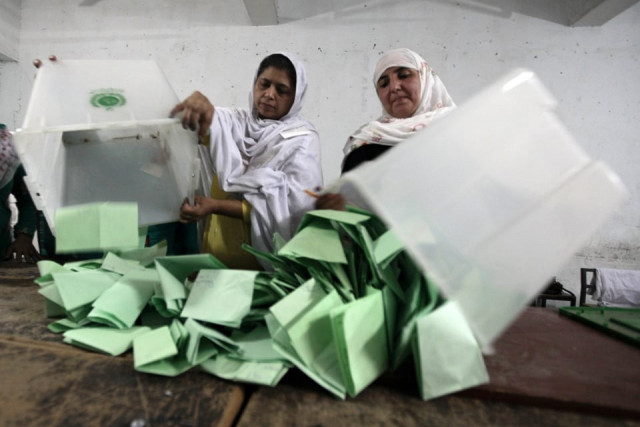Resolving political impasse: FAFEN devises three-stage poll audit formula
Methodology is based on legal requirements, says chief

In an effort to assist Imran Khan’s Pakistan Tehreek-e-Insaf and the ruling Pakistan Muslim League-Nawaz arrive at a viable agreement over the scrutiny of last year’s general elections, the Free and Fair Election Network (FAFEN) has proposed a three-stage methodology for the audit of the results.
The proposal gives an option to conduct poll audit within the legal framework mentioned by the Election Commission of Pakistan (ECP). The three-stage audit methodology is based on the legal requirements enunciated in the Representation of People’s Act 1976 and the Conduct of Election Rules 1977.
The first stage of investigation will enable to determine the actual effect of an irregularity on the election result in any of the 272 National Assembly and 577 provincial assembly constituencies down to the polling station level.
These audit steps are based on the scrutiny and analysis of election result forms and other legal documents, which are to be retained by the ECP under various provisions of law and rules.
Explaining the procedure, head of FAFEN Muddassir Rizvi told The Express Tribune that an investigating team may call the polling station wise results of all constituencies which are available in the Form 14. The said form carries results of a polling station which under the law should be displayed outside the polling station after the counting of ballots.
“Returning officer compiles the consolidated results on Form 16, based on vote count in Form 14. An audit of these forms can determine the number of polling stations where irregularities took place,” Rizvi maintained.
The second stage involves the determination of the total number of constituencies, if any, with invalid or problematic election results, that may have caused any potential or actual change in the majority in the national and provincial Assemblies.
The third stage deals with legal provisions to determine the intent of election officials to ascertain whether the irregularities were acts of omission or commission.
The findings will trigger proceedings by the ECP under Section 95 of the Representation of People’s Act 1976 against all officials who are found to be involved in irregularities whether intentionally or by omission without reasonable justification.
According to FAFEN the contesting parties should conclude the terms of reference of an election investigation that could determine, based on concrete evidence, whether the election result in one or more constituencies does not reflect the will of the voters who cast ballots on election day.
Published in The Express Tribune, October 5th, 2014.



















COMMENTS
Comments are moderated and generally will be posted if they are on-topic and not abusive.
For more information, please see our Comments FAQ